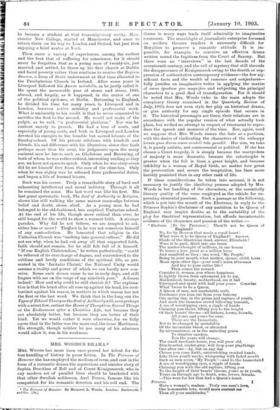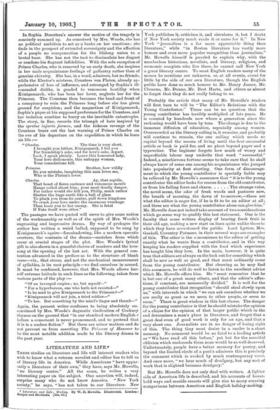MRS. WOODS'S DRAMA.*
Mite. WOODS has more than once proved her talent for the free handling of history in prose fiction. In The Princess of Hanover she has employed the medium of verse, and cast in the form of a romantic drama-the mysterious and sinister story of Sophia Dorothea of Zell and of Count Konigsmarck, who in any modern set of parallel lives should be bracketed with that other Swedish nobleman, Axel Fersen, famous like his compatriot for his romantic devotion and his evil end. The
* The Princess of Hanover. By Margaret L. Woods. London: Duckworth and Co. [SR]
theme in many ways lends itself admirably to imaginative treatment. The searchlight of journalistic enterprise focussed on modern thrones renders it extremely difficult for Royalties to preserve a romantic attitude. It is im- possible, for example, to conceive an effective drama written round the fugitives from the Court of Saxony. But there were no " interviews " in the last decade of the seventeenth century, and the veil of mystery that still shrouds the disappearance of Konigsmarck owing to the dearth or sup- pression of authoritative contemporary evidence—the few sig- nificant facts and the wealth of rumours and conjectures— fully justifies an imaginative writer in applying the maxim of omne ignotum pro magnifico and subjecting the principal characters to a good deal of transfiguration. For it should be noted that Mrs. Woods (who in the main adopts the conspiracy theory examined in the Quarterly Review of July, 1885) does not even style her play an historical drama, or give authority for any single episode that occurs. in it. The historical personages are there, their relations are in accordance with the popular version of what actually took place, but we find no attempt in respect of treatment to repro- duce the speech and manners of the time. Nor, again, need we suppose that Mrs. Woods enters the lists as a partisan, with the desire of vindicating the characters of the unhappy lovers quos durus amor crudeli tabe peredit. Her aim, we take it, is purely artistic, not controversial or political. If she has chosen a Court tragedy, it is simply because the martyrdom of majesty is more dramatic, because the catastrophe is greater when the fall is from a great height, and because infidelity in a woman of Royal birth, no matter how great the provocation and severe the temptation, has been more harshly punished than in any other rank of life.
If these considerations be taken into account, it is not necessary to justify the idealising process adopted by Mrs. Woods in her handling of the characters, or the essentially literary quality of the verse employed as the vehicle for ex- pressing elemental passions. Such a passage as the following, which is put into the mouth of the Electress, in reply to the Princess Sophia's disclaimer of any ambition to be Queen of England, may inspire doubts as to the suitability of the play for theatrical representation, but affords incontestable evidence of the eloquence and passion of the writer :—
"Electress. [To the PRINCESS.] Thou'lt not be Queen of
England?
No, for by Heaven that needs a royal heart !
What were it to be Queen of England ? Answer, Shade of the illustrious dead, answer, Elizabeth !
Were it to pack, distil into one brain The master-thought of millions, in one bosom To house a love great as a million loves And manifold as they ; one word, 'My People,' Being in your mouth, what mother, spouse, child, lover Mean upon other lips—your soul's main utterance And key to your entire life ?
Then comes the reward.
Consider it, women, you whose happiness Is lightly blown from ephemeral joy to joy, Maidenhood, beauty, motherhood, ere it fall Unwinged and spent with half your years. Consider What 'twere to be a Queen, A Queen of men, not marketable serfs.
Perchance you lean out from your balcony One spring day, in the prime and rapture of youth, And mark the immense crowd billowing beneath, A sea of worshipping eyes, a ripple of hands Claiming you theirs, lifting you to the height Of their hearts' throne—all fathers, lovers, friends, All yours and yours for ever.
These are the Immortals, Not to be changed by mutability Of the inconstant blood, or alienated By circumstance, or in the unfeeling grave To slumber careless.
You the years will change, The small mechanic hours, you will grow old, Dim-hearted, cinder-grey, will drop your playthings One after one—Ay, but on any day Choose you come forth, outstretching crooked bands, Like those youth mocks, whispering with faded mouth Such as men scorn, 'My People '—and lo, the Immortals!
A sea of worshipping eyes, a ripple of hands Claiming you with the old rapture, lifting you To the height of their hearts' throne, yours as in youth, Yours on through age to death, sons, lovers, friends.
—This were for her that had a Queen's heart.
Princess.
Have a woman's, madam. Truly one man's love, One honourable love, would more content me Than all your multitudes." In Sophia Dorothea's answer the motive of the tragedy is concisely summed up. As conceived by Mrs. Woods, she has no political ambition to act as a brake on her emotions ; she finds in the prospect of extended sovereignty and the affection of a people no compensation for the lifelong union to a brutal boor. She has not the tact to dissimulate her disgust or condone his flagrant infidelities. With the sole exception of Prince Charles, who is removed by an early death, she inspires in her male acquaintance feelings of gallantry rather than of genuine chivalry. She has, in a word, admirers, but no friends, while the Elector's mistress, Countess von Platen, already ap- prehensive of loss of influence, and estranged by Sophia's ill- concealed dislike, is goaded to venomous hostility when Kiinigsmarck, who has been her lover, neglects her for the Princess. The Countess then becomes the head and front of a conspiracy to ruin the Princess long before she has given ground for suspicion; and the magnetism of Konigsmarck, Sophia's pique at his supposed preference for the Countess, and her isolation combine to hurry on the inevitable catastrophe.
The story, in fine, records the triumph of hate inspired by the spretax injuria formae, and the hideous revenge of the Countess bears out the last warning of Prince Charles on the eve of his departure on the expedition in which he loses ais life :— " Charles. The time is very short.
I brought you hither, Konigsmarck, I bid you For friendship's sake, and for love's sake, depart. Look, I speak plainly. Leave this honoured lady, Your love dishonours, this unhappy woman, Your consolations kill.
Princess. Brother, how wildly Do you mistake, imagining this man loves me, Who is the Platen's lover.
Charles. Ay, that reptile, That beast of fierce embrace and venomous mouth Hangs coiled about him; your most deadly danger. For rather would she kill you, Philip, much rather Shatter the huge earth like a ball of glass To pluck you from its centre, pull down kingdoms To crush your love under the enormous wreckage Than loose you to her enemy. She is fatal If Fate itself were other."
The passages we have quoted will serve to give some notion of the workmanship as well as of the spirit of Mrs. Woods's engrossing and impressive drama. By way of prologue the author has written a weird ballad, supposed to be sung by Konigsmarck's squire—foreshadowing, like a modern operatic overture, the contents of the drama—snatches from which recur at crucial stages of the plot. Mrs. Woods's lyrical gift is also shown in a graceful chorus of maskers and the love- song at the opening of the last act. With the general con- tention advanced in the preface as to the structure .of blank verse—viz., that stress, and not the mechanical measurement of syllables, is its root principle—we find ourselves in accord. It must be confessed, however, that Mrs. Woods allows her- self extreme latitude in such lines as the following, taken from various parts of the play :—
" Of an inverged empire ; no, but myself—" " For a hyperborean, one who hath not resisted—" "Is he mad to give Konigsmarck to the Princess ?—" "Konigsmarck will not join, a tried soldier—" "To her. But something by the mind's finger and thumb—"
Again, the present writer confesses to being absolutely un- convinced by Mrs. Woods's dogmatic vindication of Cockney rhymes on the ground that "in our standard modern English r before a consonant is never pronounced, and to pretend that it is is a useless fiction." But these are minor matters and do
not prevent us from asserting The Princess of Hanover to
be the most notable addition made to the literary drama in the past year.







































 Previous page
Previous page